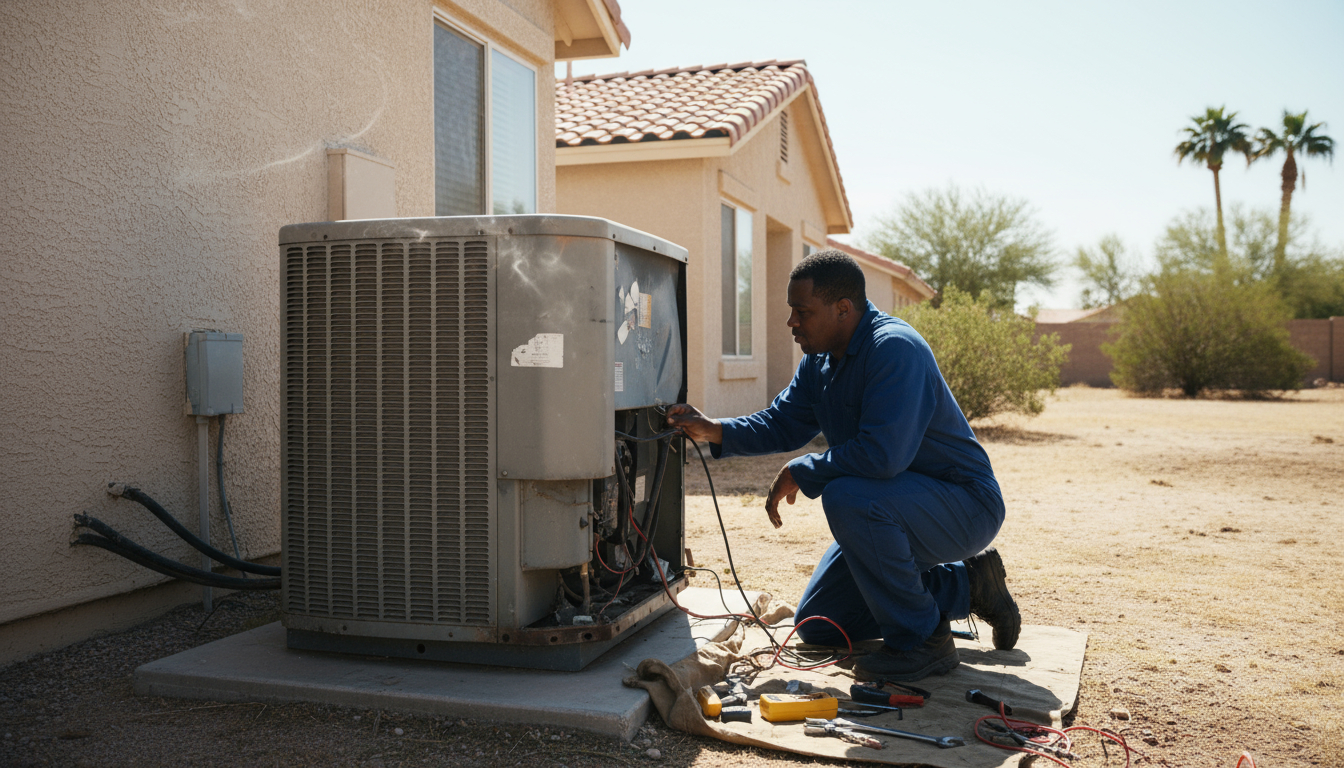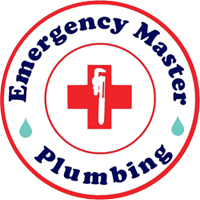

Living in Phoenix means dealing with scorching summers where temperatures routinely climb above 100°F. Your air conditioning system isn’t just a luxury—it’s a necessity for comfort and health. But what happens when your AC suddenly stops working? A broken unit can turn your home into an unbearable oven, leading to discomfort, higher energy bills, or even health risks like heat exhaustion. If you’re facing this issue, knowing the signs, causes, and steps for emergency HVAC repair in Phoenix can help you act fast and minimize damage.
In this guide, we’ll break down everything you need to know about troubleshooting a failing AC, why Phoenix’s climate makes quick action essential, and how professional services like those from Emergency Master Plumbing & Air can restore your cool air efficiently. Whether it’s a minor glitch or a major breakdown, we’ll cover problem-solving strategies to get you back on track.
Signs Your AC System is Failing
Spotting problems early can prevent a full breakdown, saving you time and money on emergency HVAC repair in Phoenix. Here are the most common indicators that your AC is on the fritz.
Unusual Noises from the Unit
One of the first red flags is strange sounds coming from your AC. Rattling, grinding, or banging noises often signal loose parts, a failing motor, or debris buildup in the system. In Phoenix’s dusty environment, dirt can accumulate quickly in outdoor condenser units, causing vibrations that lead to wear and tear.
If you hear hissing, it might indicate a refrigerant leak—a serious issue that reduces cooling efficiency and can harm the environment. Ignoring these sounds can escalate to complete failure, especially during peak summer heat when your AC runs nonstop.
Weak or No Airflow
Does your AC blow warm air or feel like a gentle breeze instead of a strong gust? Reduced airflow typically points to a clogged air filter, blocked vents, or a malfunctioning blower motor. In Arizona’s arid climate, low humidity can mask these issues at first, but over time, it strains the compressor, leading to higher energy use and uneven cooling.
Check your vents for obstructions like furniture or dust bunnies. If the problem persists, it could be a frozen evaporator coil, often caused by low refrigerant levels. Acting quickly here prevents further damage and avoids the need for costly emergency HVAC repair in Phoenix.
Higher Energy Bills and Frequent Cycling
Sudden spikes in your utility bills? Your AC might be working overtime due to inefficiency. Short cycling—where the unit turns on and off rapidly—suggests thermostat issues, electrical problems, or an oversized system struggling with Phoenix’s extreme heat.
These symptoms not only drive up costs but also shorten the lifespan of your HVAC equipment. Monitoring your bills monthly can help you catch this early, allowing for timely maintenance before a total AC stoppage.
Foul Odors or Moisture Issues
A musty smell when the AC kicks on could mean mold growth in the ducts, common in Phoenix homes with poor ventilation. Leaking water around the indoor unit signals a drainage problem, which can lead to water damage or electrical hazards.
Addressing these signs promptly solves underlying issues like bacterial buildup or condensate line clogs, ensuring your indoor air quality remains safe.
Common Causes of AC Breakdowns in Phoenix
Phoenix’s desert climate—intense sun, dust storms, and temperature swings—puts unique stress on HVAC systems. Understanding these causes empowers you to prevent emergencies.
Thermostat Malfunctions
Your thermostat is the brain of your AC. Faulty wiring, dead batteries, or outdated models can misread temperatures, causing the system to overwork or shut down unexpectedly. In Phoenix, where indoor-outdoor temperature differences can exceed 40°F, an inaccurate thermostat leads to constant adjustments and premature failure.
Solution: Calibrate your thermostat or upgrade to a smart model with Wi-Fi controls for precise monitoring. This simple fix can extend your AC’s life and reduce calls for emergency HVAC repair in Phoenix.
Refrigerant Leaks and Low Levels
Refrigerant is the lifeblood of your cooling system. Leaks often occur from corroded coils or loose fittings, exacerbated by Phoenix’s hard water and mineral deposits. Low refrigerant causes the AC to freeze up, stopping it cold.
Detecting leaks requires professional tools, as DIY attempts can worsen the problem. Recharging and sealing leaks restores efficiency and complies with EPA regulations on refrigerant handling.
Electrical and Compressor Failures
Power surges from Arizona’s occasional monsoons or aging wiring can fry capacitors and relays. The compressor, the heart of your AC, bears the brunt of Phoenix’s heat, leading to burnout if not maintained.
These failures demand immediate attention to avoid fire risks or total system replacement. Regular inspections catch electrical issues before they escalate.
Dirty Coils and Filters
Dust and pollen in Phoenix’s air clog evaporator and condenser coils, reducing heat exchange. A dirty filter restricts airflow, forcing the system to labor harder.
Problem-solving tip: Change filters every 1-3 months during summer. Professional coil cleaning prevents 80% of efficiency losses, according to industry standards.
Immediate Steps to Take When Your AC Stops Working
Don’t panic if your AC quits—follow these steps for safe, effective troubleshooting while awaiting professional emergency HVAC repair in Phoenix.
Turn Off the System and Assess Safety
First, switch off the AC at the thermostat and breaker to prevent further damage or hazards. Check for obvious issues like tripped breakers or a thermostat set too low. In Phoenix’s heat, avoid leaving it off too long; stay in cooler areas and use fans.
If you smell burning or see sparks, evacuate and call an electrician immediately—this could indicate a serious electrical fault.
Basic DIY Checks and Temporary Fixes
Inspect the outdoor unit for debris; gently clear leaves or dirt with a hose (never use a pressure washer). Inside, replace the air filter if it’s soiled. Reset the thermostat and ensure doors/windows are sealed to retain any residual cool air.
For minor issues like a tripped float switch (from drainage clogs), locate and reset it. These steps can revive 20-30% of simple stoppages, buying time until help arrives.
When to Call for Emergency Help
If basic checks fail or symptoms like no power or refrigerant smells persist, it’s time for pros. In Phoenix, delays can lead to compressor failure costing thousands. Look for 24/7 services that diagnose via phone first, minimizing wait times.
Document the issue with photos for the technician—this aids faster repairs.
Why Professional Emergency HVAC Repair is Essential in Phoenix
DIY might work for small tweaks, but Phoenix’s harsh conditions make expert intervention crucial for long-term reliability.
Expertise in Local Climate Challenges
Certified technicians understand how dry heat accelerates wear on seals and belts. They use specialized tools for accurate diagnostics, ensuring repairs address root causes like UV degradation on components.
E-E-A-T note: With years of experience in Arizona HVAC, pros follow ASHRAE standards, guaranteeing safe, efficient fixes that comply with local codes.
Cost Savings and Warranty Protection
Attempting self-repairs risks voiding warranties or causing secondary damage. Professional emergency HVAC repair in Phoenix often includes guarantees, preventing repeat visits. Early intervention can save 50% compared to full replacements.
Comprehensive System Evaluation
A service call goes beyond the fix—it includes checking ducts, insulation, and efficiency ratings. This holistic approach solves interconnected problems, like duct leaks contributing to AC strain.
What to Expect from Emergency HVAC Repair Services
When you call for help, here’s the typical process for seamless restoration.
Initial Diagnosis and Quote
Technicians arrive equipped for on-site assessment, using gauges and cameras to pinpoint issues. Expect a transparent quote within 30 minutes—no hidden fees.
In Phoenix, same-day service is standard during heatwaves, with priority for vulnerable households.
Repair Process and Timeline
Repairs might involve part replacements, refrigerant recharges, or coil cleaning. Most jobs wrap in 1-4 hours, depending on complexity. Post-repair testing ensures optimal performance.
Follow-up: Many services offer tune-ups to verify longevity.
Post-Repair Maintenance Advice
You’ll receive tips tailored to Phoenix, like scheduling biannual inspections. This prevents future AC stoppages and maintains peak efficiency.
Preventive Maintenance Tips to Avoid AC Emergencies
Proactive care keeps your system running smoothly through Arizona’s brutal summers.
Schedule Regular Tune-Ups
Annual professional cleanings remove buildup and calibrate components. In Phoenix, spring prep is key to handle June’s heat spikes.
Monitor and Upgrade Components
Install surge protectors and consider energy-efficient models with SEER ratings above 16. Seal home leaks to reduce load on the AC.
Educate Your Household
Teach family to report issues early and avoid overloading the system with excessive use.
By implementing these strategies, you can extend your AC’s lifespan by 5-10 years and sidestep emergency HVAC repair in Phoenix altogether.
In conclusion, when your AC stops working in Phoenix’s unforgiving heat, swift action is vital. From recognizing signs to seeking expert help, these steps empower you to stay cool and safe. For reliable, 24/7 emergency HVAC repair in Phoenix, trust the experienced team at Emergency Master Plumbing & Air. Our certified technicians are ready to diagnose and fix your system fast—call us today at 623-584-4706 for prompt service you can count on.
